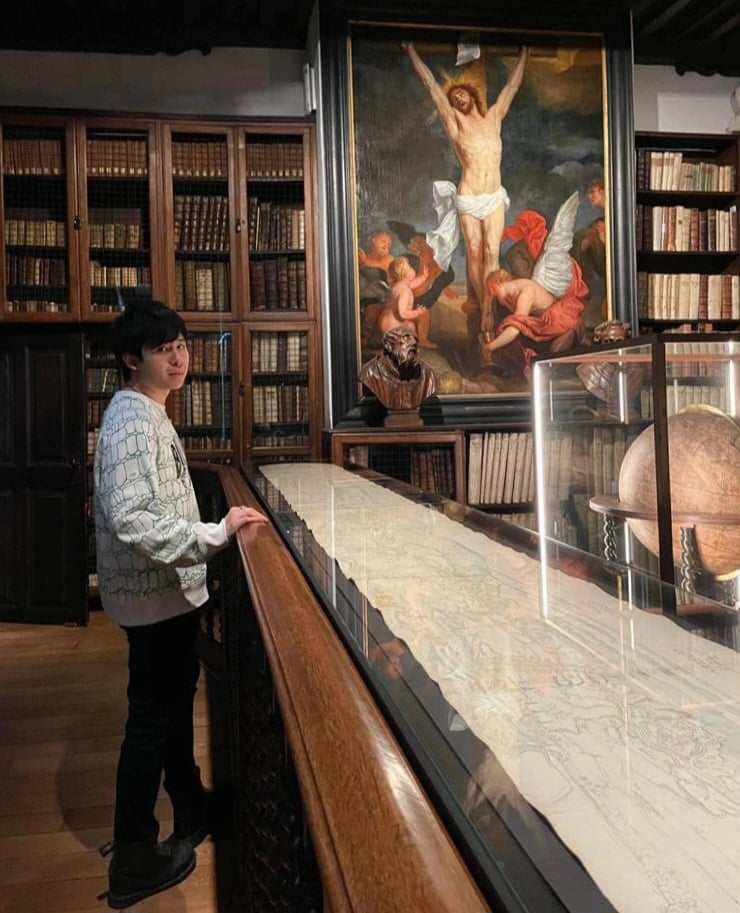
One of the Centre’s missions is to nurture a new generation of Hong Kong historians.
An Early Career Scholar Network was created under the Hong Kong History Centre in June 2023. It is intended to help create a community of Hong Kong historians and offer a platform for face-to-face interaction and academic exchange among young scholars. Research students and fresh doctoral graduates working on socioeconomic, political and cultural history of Hong Kong and its global relevance are welcomed. We usually meet thrice a year (February, June and October) with participants taking turn to present their works in each meeting. Financial support is provided for our network members attending these sessions.
Please write to Prof. Ray Yep, Research Director of Hong Kong History Centre, at rekmy@bristol.ac.uk, if you are interested in joining this Network.
——
In this post, we would like to introduce Ryan Iu, a member of the Network.
Ryan Iu is a PhD student in Bristol. In the note written by him below, he shares with us his reflections on his academic journey and current project on ‘Imperial Graduates: Mapping Hong Kong’s Elites’ Networks across the British Empire, 1862-1941’.
****
Ite ad fontes, a Latin phrase that could be translated to ‘Go back to the origins’.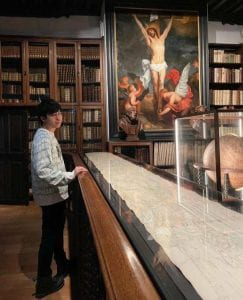
It was the summer of 2021, and I am knee-deep in archival research at the University of Hong Kong Special Collection. This wasn’t just any old summer break – no, I was on a research trip in the midst of my master’s program at the University of British Columbia, digging out useful materials for my master’s thesis. And then it happened, as I was flipping through pages of The Anglo Chinese Commercial Directory from 1915, I stumbled upon a name that caught my eye. Without hesitation, I messaged my father.
“Hey Dad, I found someone in some old Hong Kong directories from 1915 who shares the same romanization of our last name ‘Iu’ (姚 in Chinese). His name is ‘Iu Nim Yu’, and he worked as a clerk at the International Banking Corporation. I can’t believe I found this in some old directories!”
My father responded. “Yes, it is quite interesting. You know, our family has deep roots in Hong Kong, going back generations. I’ve heard that our unique romanization of ‘Iu’ instead of the more common ‘Yiu’ stems from our ancestor’s desire to differentiate themselves from other ‘Yius’.”
Fast forward to the summer of 2023. After acquiring the genealogy book from a distant relative in Hong Kong, I dove into its pages, eager to trace my family’s roots. What I discovered left me utterly stunned, mouth agape in disbelief. ‘Iu Nim Yu’ was not just a random name from the past – he was my great-grandfather, operating under a pseudonym. None of my immediate family members had any clue of this discovery; after all, my great-grandfather had passed away when my grandfather was just a toddler, and my grandfather himself had long left this world before I came into it. Further research revealed that the Iu family had wielded significant influence within the comprador networks of the International Banking Corporation (now Citibank) in Hong Kong during the early twentieth century.
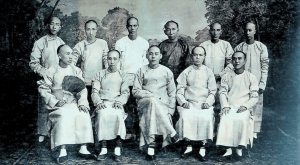
1906年香港萬國寶通銀行分行的員工和買辦。圖中11人有5人姓「姚」(Iu)。 (相片來源:Peter Starr, Citibank: A Century in Asia (Singapore: Editions Didier Millet, 2002), 32.)
Well, of course, my passion for studying the past extends beyond being an ancestry detective. Vice versa, thanks to my obsession with history, it pays to go back to my origins – you never know what fascinating secrets you might uncover along the way. My interest in history started when I was a child – it was diverse, ranging from ancient Chinese history (thanks to the novel Romance of the Three Kingdoms) to modern European history (courtesy of the movie The Sound of Music). This passion led me to major in history at the University of British Columbia. After earning my BA, I hungered for more knowledge and initially planned to research the populace’s opinion in Germany towards the Treaty of Versailles. However, due to a language barrier in German, I shifted my focus to my hometown – Hong Kong – and ended up writing a master’s thesis titled ‘The Government Central School and the Elite Networks in Early Colonial Hong Kong’. Initially, I intended to study the multi-ethnic body of students in the Central School, but as I delved into my research, I became fascinated by the interconnected networks among the elite alumni, who formed such networks through marriage, political and commercial collaborations, civic partnerships, etc. I argued that the multi-ethnic and multi-cultural Central School was a conducive site for building networks and fostering a conflicting ‘Westernized Chineseness’ mentality among these elites. Besides, I have built a Digital Humanities side project to visually represent the intricate networks of key bureaucratic figures in early colonial Hong Kong, revealing insights that may have been overlooked using traditional research method.
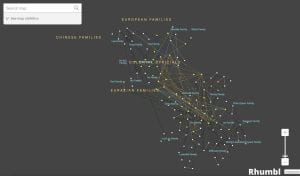
數位人文平台: 早期殖民時期香港的網絡 – Rhumbl圖表
I saw potential in my research upon completing my master’s studies. What if I expand my investigation on the Hong Kong-based elite networks and reconsider them in a local, transregional, and intra-imperial context beyond Hong Kong and within the British Empire? In my proposed Ph.D. project tentatively titled ‘Imperial Graduates: Mapping Hong Kong’s Elites’ Networks across the British Empire, 1862-1941’, I aim to further investigate deeper into how these individuals have structured transpacific, maritime, and intra-imperial connections. By tracing their biographical experiences and extensive networks – beyond textual sources like newspapers and archival documents – I hope to recruit family members or descendants of these elites in oral history interviews, gathering insights into life stories and involvements of their elite ancestors while tracing their ancestry, origins, and familial networks.
Hong Kong was – and still is – a transnational hub. My research aims to reflect on the historical experiences and mechanism of empire and place Hong Kong within the framework of transnational (or transregional) and global history. It allows me to reimagine Hong Kong – through the Hong Kong-based elite network – as one dimension of the interconnected circulation of assets, ideas, institutions, objects, and social and cultural capital, and more.
Looking ahead, I hope the case studies in my research will inspire people to ponder their origins and ancestry, enriching the understanding of family histories. After all, everyone is connected through various types of networks. I am grateful to have been a student associate at the University of British Columbia’s Hong Kong Studies Initiative. Now, I am honoured and excited to be part of the University of Bristol’s Hong Kong History Centre family – with a vibrant network of young scholars – allowing me to contribute to the history of Hong Kong by pursuing my passion for uncovering the past and exploring origins.
Ite ad fontes, everyone.
****
Ite ad fontes ——一個拉丁詞語,可以翻譯為「回到起源」。
2021年的夏天,我在香港大學特藏部埋首檔案研究。不,這不僅是個普通的暑假,當時我在攻讀卑詩大學碩士學位的途中開展了研究旅程,到香港挖掘出有用的史料來撰寫我的碩士論文。正當我的指尖翻閱著1915年《香港中華商業交通人名指南錄》,一個名字引起我注意。我毫不猶豫,立即傳訊息給我父親。
「爸,我在一些1915年的香港企業名錄裏,找到一個人與我們姓氏有著相同英文拼音IU(中文為姚)。他名字是『姚念愈』,曾在萬國寶通銀行擔任文員。我真不敢相信我在這些古老企業名錄中發現這個!」
我的父親回覆道:「是的,這確實有趣。你知道嗎?我們家族在香港紮根甚深,能回溯到好幾代以前。我曾聽說我們獨特的『IU』拼音,而非更常見的『YIU』,是源於我們祖先想要區別於其他『YIU』的姚氏。」
快轉到2023年的夏天。我從一位香港遠房親戚那裡得到族譜後,潛進字裏行間,渴望追溯我的家族根源。而當中的發現使我震驚,目瞪口呆,難以置信:「姚念愈」不是一個普通名字——他是我的太爺,而企業名錄記載的是他的字號。我的家人中沒有人知道他的字號;畢竟,我的太爺在我爺爺還是嬰兒的時候就去世了,而我爺爺也在我出生之前就過身了。在進一步研究後,我發現姚(IU) 氏家族在二十世紀初香港萬國寶通銀行(現為花旗銀行)的商業聯繫網中擁有重要影響力。
當然,我對於研究歷史的熱情不止於追溯我的家族根源。反過來說,我對歷史的著迷引領我「回到起源」——你永不知道在過程裏有甚麼等待你去發挖。我對歷史的興趣始於童年時期——從中國古代歷史(多虧《三國演義》這部小說)到現代歐洲歷史(嗚謝電影《仙樂飄飄處處聞》)。這份對歷史的「愛」引導我在卑詩大學主修歷史。取得學士學位後,我渴求更多歷史知識而修讀碩士,最初計劃研究德國民眾對凡爾賽條約的輿論和民意。然而,由於我不諳德文,我把焦點轉移向我的家鄉——香港——並最終寫了名為《中央書院與香港早期殖民時期的精英網絡》的碩士論文。寫作論文初期,我本打算研究中央書院的多元種族學生群體,但隨著深入研究,我著迷於精英校友之間相互關聯的網絡,這些精英透過婚姻、政治和商業合作、公民合作等形式建立起這樣的網絡。我認為,多元種族和多文化的中央書院有助於精英們建立人際網絡和培養出矛盾的『西方化華人特質』心態。另外,我還建立了一個數位人文的副項目,以視覺方式呈現早期殖民時期香港重要官僚人員的複雜網絡,揭示可能被傳統研究方法忽略的見解。
完成碩士學業後,我看到了這個題目的研究潛力。如果我將我的研究擴展到香港的精英網絡,並將其置於超越香港、跨地區和大英帝國內部的脈絡裏呢?在我暫定為《帝國畢業生:繪製香港精英網絡在大英帝國內的地圖,1862-1941》的博士研究項目中,我希望進一步研究這些個體如何構建跨太平洋、南洋和帝國內部的聯繫。通過追蹤他們的生平和廣泛網絡——在報紙和檔案等文字資料外——我打算招募這些精英的家人或後代作口述歷史訪談,收集有關他們精英祖先的生活故事和見解,同時追溯他們的起源和家族網絡。
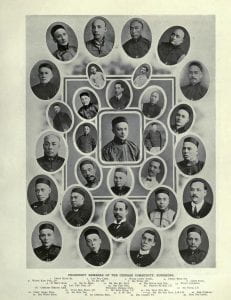
早期香港華人社區的知名成員。(相片來源:Arnold Wright and H.A Cartwright, Twentieth Century Impressions of Hong Kong, Shanghai, and Other Treaty Ports of China: Their History, People, Commerce, Industries and Resources (London: Lloyds Greater Britain Publishing Co., 1908), 183.)
香港曾經——且仍是——跨國樞紐。我的研究希望反映帝國的歷史經驗和機制,並將香港置於跨國(或跨地區)和全球歷史的框架之內。透過香港的精英網絡,這使我重新想像香港作為資產、思想、機構、物品、社會資本及文化資本等相互關聯流通的面向。
未來,我希望我研究中的案例研究能夠激發人們思考自己的起源和家族血脈,豐富對家族歷史的理解。畢竟,每個人都通過各種類型的網絡相互聯繫。我很感恩在修讀碩士時能成為卑詩大學共研香江的學生成員。現在,我很榮幸能夠成為布里斯托大學香港史研究中心這個家庭的一員,與一群充滿活力的年輕學者共事,追求對過去的挖掘和探索起源的熱情,為香港歷史做出微小的貢獻。
各位,Ite ad fontes。